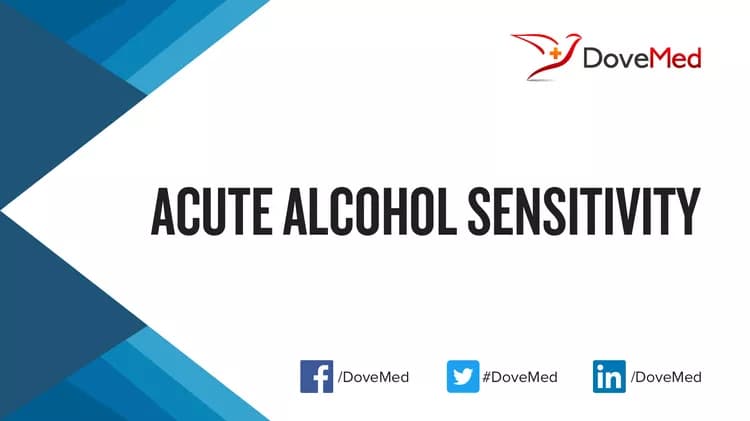What are the other Names for this Condition? (Also known as/Synonyms)
- Alcohol Intolerance
- Susceptibility to Hangover
What is Acute Alcohol Sensitivity? (Definition/Background Information)
- Acute Alcohol Sensitivity or Alcohol Intolerance, is characterized by immediate unpleasant reactions after drinking alcohol
- Alcohol Intolerance is caused by a genetic condition in which the body is unable to breakdown alcohol efficiently, usually found in Asians
- These individuals accumulate acetaldehyde, the primary metabolite of ethanol, because of a genetic polymorphism of aldehyde dehydrogenase (ALDH) that metabolizes acetaldehyde to nontoxic acetate
- The most common signs and symptoms of Alcohol Intolerance are stuffy nose and skin flushing
- The only way to prevent Alcohol Intolerance reactions is to avoid alcohol. The condition is not an allergy
- However, in some cases, what seems to be Alcohol Intolerance may be a reaction to something in an alcoholic beverage, such as chemicals, grains or preservatives. Combining alcohol with certain medications also can cause reactions
- In rare instances, an unpleasant reaction to alcohol can be a sign of a serious underlying health problem that requires diagnosis and treatment
(Source: Acute Alcohol Sensitivity; Genetic and Rare Disease Information Center (GARD) of National Center for Advancing Translational Science (NCATS), USA.)
Who gets Acute Alcohol Sensitivity? (Age and Sex Distribution)
- Acute Alcohol Sensitivity is a rare disorder. The presentation of symptoms may occur when an individual consumes alcohol
- Both males and females may be affected
- Worldwide, individuals of all racial and ethnic groups may be affected
What are the Risk Factors for Acute Alcohol Sensitivity? (Predisposing Factors)
The risk factors for Acute Alcohol Sensitivity may include the following:
- A family history of Acute Alcohol Sensitivity
- Being of Asian descent
- Pre-existing conditions such as asthma
- An underlying health problem, such as Hodgkin’s lymphoma
It is important to note that having a risk factor does not mean that one will get the condition. A risk factor increases one’s chances of getting a condition compared to an individual without the risk factors. Some risk factors are more important than others.
Also, not having a risk factor does not mean that an individual will not get the condition. It is always important to discuss the effect of risk factors with your healthcare provider.
What are the Causes of Acute Alcohol Sensitivity? (Etiology)
- Acute Alcohol Sensitivity is caused by a genetic condition in which the body lacks an enzyme that breaks down alcohol or certain harmful substances contained within alcohol
- A polymorphism of the gene ALDH2 gene on chormosome 12, coding for aldehyde dehydrogenase 2 enzyme (coded by) may lead to absence of this enzyme in the livers of affected individuals
- ALDH2 enzyme metabolizes acetaldehyde to nontoxic acetate
- In ALDH2 deficient individuals, there is build-up of acetaldehyde in blood, leading to the signs and symptoms
What are the Signs and Symptoms of Acute Alcohol Sensitivity?
The signs and symptoms of Acute Alcohol Sensitivity may vary among affected individuals in type and severity. The signs and symptoms may include:
- Delayed oxidation of acetaldehyde
- Facial flushing after alcohol intake
- Stuffy nose
(Source: Acute Alcohol Sensitivity; Genetic and Rare Disease Information Center (GARD) of National Center for Advancing Translational Science (NCATS), USA.)
In addition to the above, the following signs and symptoms may also be present:
- Sweating
- Nausea and vomiting
- Itching of skin, hives
- Diarrhea
- Respiratory distress, in individuals with asthma
- An enhanced potency of medications that an individual is taking; this may lead to unpleasant side effects (such as lowering of blood pressure, drowsiness, and gastrointestinal bleeding, among others)
How is Acute Alcohol Sensitivity Diagnosed?
Acute Alcohol Sensitivity is diagnosed on the basis of the following information:
- Complete physical examination
- Thorough medical history evaluation
- Assessment of signs and symptoms
- Laboratory tests, which may include skin and blood tests to check for allergies to alcohol or other ingredients in alcoholic beverages
- Imaging studies
- Biopsy studies, if necessary
Many clinical conditions may have similar signs and symptoms. Your healthcare provider may perform additional tests to rule out other clinical conditions to arrive at a definitive diagnosis.
What are the possible Complications of Acute Alcohol Sensitivity?
The complications of Acute Alcohol Sensitivity may include:
- Sedation after consumption of alcohol (passing out)
- Severe headache or migraine
Complications may occur with or without treatment, and in some cases, due to treatment also
How is Acute Alcohol Sensitivity Treated?
The treatment for Acute Alcohol Sensitivity is symptomatic. If one develops a serious allergic reaction, epinephrine injections may be given.
How can Acute Alcohol Sensitivity be Prevented?
Acute Alcohol Sensitivity may not be preventable, if it is caused by ALDH2 deficiency.
- Avoiding alcohol consumption is the best way to prevent the condition from occurring
- Active research is currently being performed to explore the possibilities for treatment and prevention of disorders such as Acute Alcohol Sensitivity
- If an allergy to an ingredient in an alcoholic beverage causes Alcohol Intolerance, then identifying the ingredient may be helpful
- Wearing a bracelet or necklace with allergy information may help alert others to act swiftly, if one is unable to communicate
- Carrying a dose of epinephrine may help avoid life-threatening allergic reactions
Regular medical screening at periodic intervals with tests and physical examinations are recommended.
What is the Prognosis of Acute Alcohol Sensitivity? (Outcomes/Resolutions)
- The prognosis of Acute Alcohol Sensitivity is dependent upon the severity of the signs and symptoms and associated complications, if any
- Individuals with mild conditions have better prognosis than those with severe symptoms and complications
Additional and Relevant Useful Information for Acute Alcohol Sensitivity:
The following DoveMed website link is a useful resource for additional information:
Related Articles
Test Your Knowledge
Asked by users
Related Centers
Related Specialties
Related Physicians
Related Procedures
Related Resources
Join DoveHubs
and connect with fellow professionals


0 Comments
Please log in to post a comment.